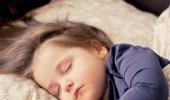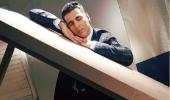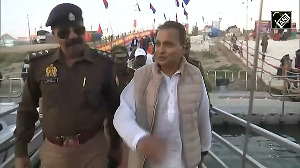Sleeplessness is increasingly becoming a lifestyle disorder, says Amrita Singh.

A few days ago, I put out this message on Instagram: 'If you have or have had sleeplessness, talk to me.'
I expected a few night owls to get in touch with me, but the response I got was overwhelming.
I was inundated with messages from people my age (I'm in my early twenties) narrating the trauma of routinely experiencing sleepless nights.
Insomnia is a condition in which a person is unable to fall asleep or remain asleep for a desirable number of hours -- doctors recommend between 6 and 8 hours of sleep every night.
This lack of sleep leads to lethargy, irritability, mood swings and decreased performance.
Like most other disorders, insomnia can be acute or chronic.
If a person has three or more sleepless nights in a week for more than three months, the condition is considered to be chronic.
Insomnia is not a new phenomenon.
What is new, perhaps, is that it seems to be on the rise among young adults -- and even children.
Not surprisingly, one of the leading causes is tech-enabled lifestyles.
Technology, coupled with the pressures of office or academics and an on-the-go lifestyle, is leading to disturbed sleep patterns.
According to Samir Parikh, psychiatrist and director, Fortis national mental health programme, Delhi, "an acceptance of sleeplessness as a part of our lifestyles" is what is leading to all these sleepless nights. Our evening routine has drastically changed in the last 30 to 40 years."
"Instead of relaxing at home, we take work back with us. In fact, the mere presence of a laptop is enough to trigger the mind," Dr Parikh adds.
He says our time for recreation has been taken up by technology, work and social-media activity due to which our minds continue to remain active late into the night.
Sleep, explains Dr Parikh, is a conditioned response.
Ideally, on seeing a bed after a long day at work, one should feel the need to sleep.
But when the bed becomes one's workplace, dining area and television couch, our minds do a good job of stuffing sleep into a corner, says the doctor.
On top of that, reduced physical activity in the age of the Internet doesn't help as our bodies aren't tired enough.
Rohan Agrawal, a 24-year-old corporate lawyer, cannot sleep before 3 in the morning even if he has had an exhausting day.
And he says he doesn't get a wink's sleep on at least three nights in a week.
"I've been experiencing sleeplessness since I was in college. I think it started when I began studying at night," says Agrawal.
"And now, I spend my nights watching Netflix because I can't fall asleep easily."
Tanmaya Arora, a 22-year-old student who is interning with a research scholar at Jawaharlal Nehru University, says she turns into "a monster" when she doesn't get sleep the night before. I tend to be cranky the next day. But the worst is that I usually end up getting a migraine."
Arora, too, experiences three to four sleepless nights every week.
Vyoma Sharma, a 22-year-old student in Hong Kong, uses melatonin to sleep.
Melatonin, a hormone secreted by the pineal gland (a small endocrine gland in the brain), tells the body when to sleep and when to wake up.
Sharma began taking the medication on the advice of her therapist, but is now trying to reduce her dependency on the hormone.
While most people accept the condition and often do not discuss it even with friends or family, some turn to medication.

Sleeplessness is rampant and is claiming younger victims by the night, says H N Mallick, a professor of physiology at the All India Institute of Medical Sciences and the president of the Indian Society for Sleep Research which was founded in 1992 to study sleep science and sleep medicine.
"Early school timings, peer pressure, homework, blue light from phones, laptops and other electronic gadgets are responsible for sleeplessness in children," he says, adding, "The blue light used in these gadgets shifts the circadian rhythm (the natural, internal process of the body that regulates sleep-wake cycles)."
AIIMS has a sleep laboratory, one of the oldest in the country that was founded in 1966.
The lab keeps track of physiological parameters such as EEG, ECG, BP, respiration, oxygen saturation, temperature, body movement and behaviour by hooking up a number of electrodes, sensors and belts to patients suffering from sleeplessness.
The record displays results such as sleep latency (the time the body takes to fall asleep after wakefulness), sleep types (non-REM, which is a relatively light form of sleep, and REM, which is deep sleep) total sleep duration, arousals, leg movement, respiration, heart rate, oxygen saturation, apnea and other such details.
The patients's sleep is also monitored on video to record their behaviour while they sleep.
Based on these records, patients are advised to either buy devices such as nasal pillows, attend counselling sessions or sign up for physiotherapy.
Despite the existence of a sleep centre at one of India's biggest hospitals, not many people who suffer from sleeplessness know of such centres, several of which are privately run.
Most of these labs maintain regular contact with patients to help them keep up with the suggested course of treatment.
Sleeplessness, says Dr Parikh, is a modern-day lifestyle disorder that needs to be taken seriously.
Mallick suggests incorporating 'sleep' into the school curriculum -- educating students about the importance of good sleep hygiene and healthy sleep habits.
THE DOZE
Technology, often the reason for sleeplessness, is also offering solutions to the problem.
Sleep Cycle, an application available on both iPhone and Android, monitors the user's sleep patterns to provide detailed statistics so that the user can identify the problem areas.
It also has an inbuilt smart alarm system that wakes the user up only at the most perfect time when s/he is in her/his lightest sleep phase and is likely to be feeling most rested.
Another application, Relax and Sleep Well, has been created by hypnotherapist Glenn Harrold.
The hypnosis and meditation app has recordings to address insomnia, stress and anxiety.
Besides these applications, the market is flooded with products such as Tranquil Sleep, an oil-based solution that can be applied on the temples.
Or, curved and contoured foam pillows that promise better sleep.
*Images posted only for representational purposes.












 © 2025
© 2025